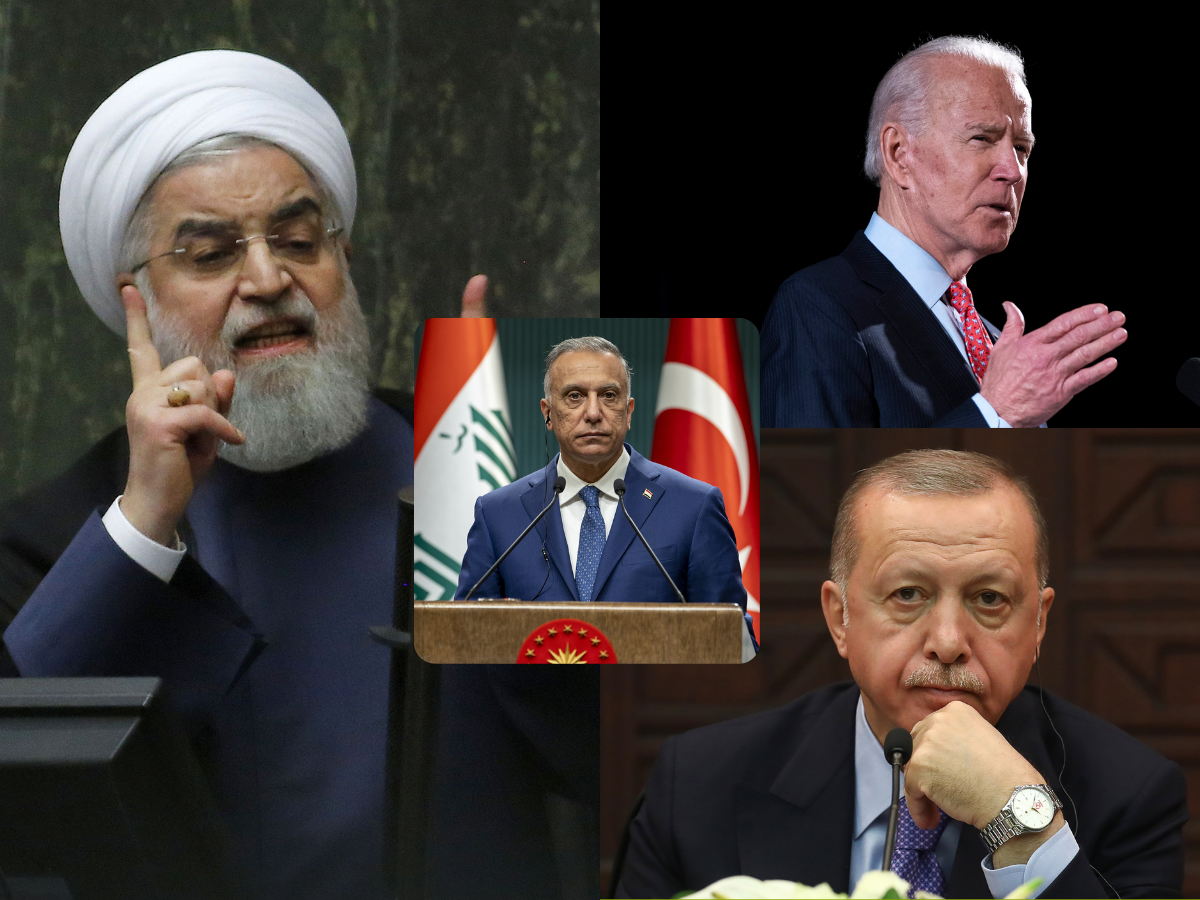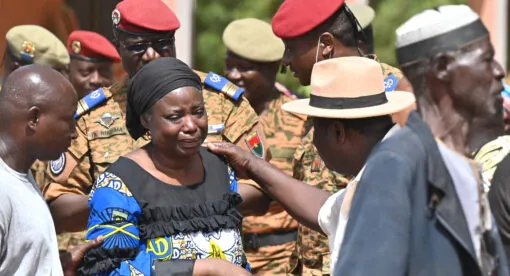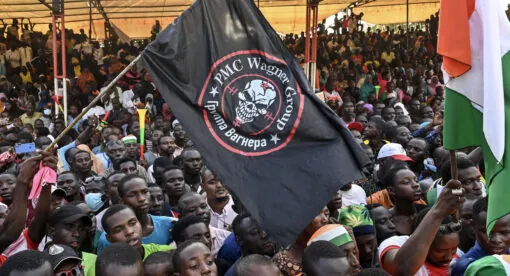The rocket attacks in Iraqi Kurdistan’s capital, likely by elements from within the Iran-aligned Iraqi Shiite militia nexus, are an opportunity for Washington to recognize it is without a policy, let alone a long-term strategy, in Iraq.
A series of rocket strikes in Iraqi Kurdistan’s capital, Erbil, on Feb. 15 are the latest in a string of “resistance axis” activity that has undermined Iraq’s security, endangered civilians, rendered the central state weak and incapable, and added the possibility of a larger regional escalation between Iran-aligned groups and their rivals. The attacks sent a warning message to the Kurdistan Regional Government (KRG), the federal government of Iraq, and foreign actors including the U.S. and Turkey.
Launched from within Iraqi Kurdistan, likely by a proxy of Iran-aligned Iraqi Shiite militias, a series of rocket attacks targeted areas in and around the city, with one landing in Naz City, one in Waziran, one in a livestock market, and two outside Erbil International Airport – a site surrounded by urban and residential areas and a base that houses U.S. military personnel. The rockets that struck the airport killed one civilian contractor and wounded nine others, including a U.S. soldier.
A New Militia Playbook
The Popular Mobilization Forces (PMF) are an umbrella of Iraqi state-sponsored armed groups and militias under the command of Iraq’s prime minister. The PMF have incorporated within their ranks some of the most notorious Shiite militias, namely Asaib Ahl al-Haq and Kataib Hezbollah, which have been involved in human rights violations and organized crime. These militias overtly object to U.S. presence in Iraq in all forms and have boasted about attacking U.S. interests, referring to themselves as “the resistance” They answer to Iran despite being part of the Iraqi state’s security apparatus.
During the Trump administration, the U.S. did not hesitate to carry out strikes against militias, killing scores of their cadre. To seek cover from a more hardline U.S., these groups adopted a new strategy, creating offshoot groups to act as facades to carry out high-stakes attacks. These groups were different in name only. By blurring lines of accountability, resistance militias can continue to pressure Baghdad and Washington through intimidating attacks and take cover with plausible deniability, ultimately blaming the attacks on “rogue elements” only loosely associated with established Shiite militias.
The militia that claimed responsibility for the Erbil attack is not a familiar one among Iraqi and Western security experts but a newly established group: Awliya al-Dam (which roughly translates to the “Protectors of the Blood”). Awliya al-Dam claimed responsibility just hours after the strikes took place, vowing that “Americans everywhere in Iraq, even Kurdistan, will be targeted” and posting a graphic on the resistance’s Telegram channel depicting the rocket with the description: “Surprise Baby Surprise.” In a statement released a day after the attack, Awliya al-Dam threatened future assaults and warned Kurdish officials of the “wrong path” they have taken in supporting both the U.S. and Turkish “occupations,” inflating the death toll above American and KRG accounts.
Though casualties were relatively low, the rockets, which struck a main road during busy hours, could have killed many more people. The attacks were designed to convey a clear message to both the U.S. and the Iraqi federal government: No corner of Iraq, however populated or secure it may seem, is safe from militia interference.
It is difficult to entirely separate Awliya al-Dam and the attack on Erbil from Iran and its proxies. It is true that some resistance militias occasionally act independently of Iran, but an attack on a high-profile target like Erbil International Airport could not be carried out without Tehran’s knowledge (if not orders). Additionally, Awliya al-Dam did not shy away from circulating Iran-sympathetic messages. The group’s vow to continue seeking “revenge for the leaders of victory” was a reference to Iranian Gen. Qassem Soleimani and Kataib Hezbollah Secretary-General Abu Mahdi al-Muhandis who were killed in a U.S. drone strike in early 2020. The reference to these two figures suggests that Awliya al-Dam is linked to Iran’s Islamic Revolutionary Guards Corps and Kataib Hezbollah. And while Iran denied the attack and its proxy militias have remained silent, Iran-linked militias like the Islamic Resistance Zulfiqar Forces endorsed the strikes.
Intimidating Erbil and Baghdad
The strikes appear to be designed as a warning to domestic opponents of Iran-aligned Shiite militias in Iraq’s federal government and the KRG. Political and military elements of the resistance are looking to carve out further influence in Iraq, particularly ahead of parliamentary elections in October and pressure from Iraqi Prime Minister Mustafa al-Kadhimi. At stake is the potential for al-Kadhimi to gain more comfortable control over the country at the expense of the Fatah alliance, the political arm of the PMF. For hardline pro-Iran parties, reduced power in parliament could ultimately weaken Iran’s hand in Baghdad and truncate Iran-aligned militias’ leverage over the Iraqi Security Forces and national policy.
Additionally, resistance militias are threatened by recent promises from al-Kadhimi to expose and arrest 16 gang members that killed activists and journalists in Basra province – individuals suspected to be resistance militiamen. For Iran-aligned groups, attacks on urban centers like Erbil are a vehicle to weaken governmental control, exacerbating tensions between regional governments, imposing fear among citizens, and creating distrust in Baghdad’s ability to rein in “rogue” groups that threaten Iraqi security.
Within the same context, the ruling Kurdish Democratic Party (KDP) was another recipient of the militia’s message of intimidation. Strengthened ties between the party and Turkey could jeopardize the presence of the Iran-aligned militias within the PMF in northern Iraq where they hope to expand influence, especially in the disputed Sinjar District. Sources within the KRG Peshmerga have suggested that the breach in Erbil’s security could have been an inside job, made possible by collaboration between Iran-backed militias and KRG security personnel, reflecting emerging Iranian influence deep inside KRG territory.
The KDP also finds itself on the defensive, with Iran-aligned militias seeking ideological influence among Kurdish citizens; shortly after the attacks, the resistance axis circulated critical messages pushing anti-Turkey and anti-KRG propaganda intended for a Kurdish audience. By threatening Kurdish security from the inside, these militias wish to undermine Erbil’s faith in the ability of Washington and Baghdad to curb the violence – thereby forcing the KRG to seek Tehran’s help in halting attacks. The KRG finds itself in a hot spot once again between public anger at Turkey’s impending military surge and the risk of more attacks by Iran-aligned militias.
Strong-arming Washington and Ankara
The timing and nature of the strikes also illustrate resistance militias’ larger geopolitical designs with external actors, especially regarding U.S. pressure and Turkey’s push into Iraq.
During former President Donald Trump’s last months in office, the IRGC’s top ranks instructed proxies to obey a months-long pause in attacks against U.S. assets in an effort not to risk escalation with the hawkish administration in Washington and sow seeds of goodwill with the incoming Biden administration. The promise of a renegotiated JCPOA nuclear deal, and the sanctions relief that would likely accompany it, was enough of an incentive for Tehran to press the brakes.
Yet the first month of the Biden administration shattered Tehran’s hope for short-term sanctions relief, with President Joe Biden asserting that the U.S. would require Iran’s return to the negotiating table before Washington turned back the dial on sanctions. In the absence of an immediate shift in Washington, Iran turned back to its former strategy, twisting the coalition’s arm in Iraq through successive strikes on its positions and assets in an effort to pressure an American withdrawal and create leverage in nuclear negotiations.
The strategy appeared to have worked for Tehran in the last year of the Trump administration: after the PMF perpetrated a string of attacks on bases such as al-Asad, K-1, al-Qaim, and Baghdad International Airport in early 2020, U.S. forces initiated eight base transfers and withdrew almost 3,000 troops from Iraq. The U.S.-led coalition said it undertook these maneuvers to promote increased independence for the Iraqi army, but U.S. defense officials said militia encroachment was a key factor.
Turkey, too, was a target audience of the Erbil attack. Coordinating with its campaign for influence in northern Syria, Ankara has sought to project influence in Iraqi Kurdistan through a series of military operations against the Kurdistan Workers’ Party (PKK) and by strengthening political and economic relations with the KRG. While Iran and Turkey have engaged in limited cooperation in countering Kurdish insurgents in the Qandil Mountains along the Iraqi-Turkish-Iranian border, the countries have divergent aims in Iraq.
Ahead of signs that Turkey was seeking to expand its military footprint in northern Iraq with an attack on Ninewa province within the next few days, Iran-aligned proxies likely chose Erbil – the capital of Turkey’s closest partner in Iraq – as a clear message to Ankara to back down. Shiite militias affiliated with Iran such as Harakat Hezbollah al-Nujaba released statements threatening Turkey’s “occupation forces” with military action if Ankara acted against PKK factions in Ninewa province. Thus far, Iran’s warning to Turkey may be in vain; Turkish President Recep Tayyip Erdogan authorized plans to expand military strikes in Iraq the day after the Erbil attack, building upon its four-day Operation Claw-Eagle 2 in Gara that will likely ruffle feathers among Iraq’s Shiite militias.
Biden Needs A Strategy
This is not the first time that Iran-backed militias have targeted Erbil. On Sept. 30, 2020, militias launched six rockets from the borders of Ninewa province targeting U.S. forces at the Erbil International Airport, but those strikes were intercepted.
The Feb. 15 attack also is similar to one that killed a U.S. contractor in December 2019. That attack sparked American and Iranian tit-for-tat strikes that included the killing of Soleimani and al-Muhandis on Jan. 3, 2020, and an Iranian retaliatory ballistic missile strike on the U.S. al-Asad airbase that injured over 100 U.S. troops. But with a new Biden administration, all eyes now shift to Washington amidst its first major test from Iran and its proxies in Iraq.
Thus far, U.S. Secretary of State Antony Blinken has condemned the attack and has vowed to work with the KRG to identify the perpetrators. And in a U.N. Security Council meeting the day after the Erbil attacks, acting U.S. Ambassador Richard Mills said Iran-aligned militias and sponsored destabilizing activities in Iraq must be addressed to create a “conducive environment” for the country’s October elections. Mills’ wording was stronger than Blinken’s, but the brief statement did not outline any strategy.
The strikes in Erbil are an opportunity for Washington to recognize it is without a policy, let alone a long-term strategy, in Iraq. While the administration has vowed to continue coalition efforts against ISIS and re-approach the Iran nuclear deal, it has not constructed a comprehensive plan for Iraq. Reviving the policy of compartmentalizing security priorities – a tendency of the Obama administration – will fail to address the malign activity of these groups. Without strategic foresight, the Biden administration will fall into the same habit of its predecessors, making ad-hoc, reactionary decisions that fail to address structural problems.
Washington should ensure it does not fall into the trap that Tehran wants it to, attributing responsibility to smaller offshoot Shiite militias that serve the larger interests of PMF factions and the IRGC. Instead, the U.S. should seek to work with the KRG and the Iraqi government to publicly spotlight these groups’ connections through investigations that can reduce their plausible deniability. By collecting evidence that links resistance militias to Tehran and attacks, the U.S. can wield significant leverage in future negotiations on the nuclear deal and compel Iran to reconsider its malign activities.
Newcomer militias linked to PMF factions have opened several fronts with the potential to escalate a larger geopolitical quagmire among the KRG, the U.S., Turkey, and Baghdad itself. While Iraqi Shiite militias continue to focus on squeezing the U.S.-led coalition and creating offshoot groups to blur lines of accountability, there is a renewed focus on Iraqi Kurdistan, shifting to a more formal alliance with PKK elements, and countering Turkish influence in Iraq. The new pattern of militia behavior indicates that Iraqi Kurdistan – once widely thought of as the safest region in Iraq – will likely be the target of more strikes at the direct or indirect instruction of Tehran, complicating Washington’s strategy in Iraq, Ankara’s designs in Ninewa province, and Baghdad’s and Erbil’s ability to impose control.
Caroline Rose is a Senior Analyst and Head of the Strategic Vacuums program in the Human Security unit at the Newlines Institute. Her commentary and work on geopolitics and Middle Eastern affairs have been featured in Foreign Policy, The Independent, Alhurra, Limes Magazine, and the Atlantic Council’s MENASource. You can follow her on Twitter at @CarolineRose8.
Rasha Al Aqeedi is a Senior Analyst and the Head of the Nonstate Actors program in the Human Security Unit at the Newlines Institute. Prior to joining the Newlines Institute, Al Aqeedi was the editor in charge of “Irfaa Sawtak,” a U.S.-based platform that offers insights into post-conflict communities in Iraq and Syria.. She has also served as a Fellow with the Foreign Policy Research Institute and George Washington University’s Program on Extremism and tweets at @RashaAlAqeedi.
The views expressed in this article are those of the authors and not an official policy or position of the Newlines Institute.








